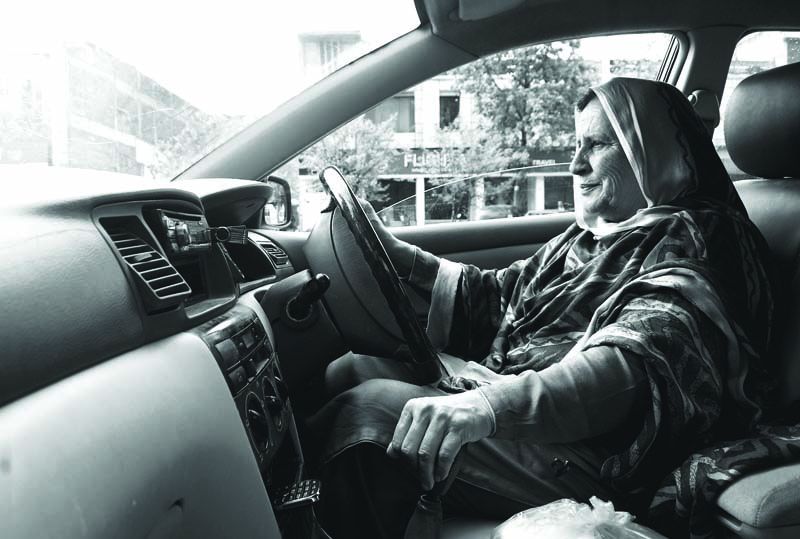
To support her family — two sons and five daughters — Kazmi worked as a domestic helper and later took up a job at a cloth factory. But the wages were too meager to make ends meet, shares Kazmi. “All doors [of opportunity] seemed closed but I didn’t lose heart because I had to feed my children and I wanted to educate them so they could become responsible citizens,” she adds.
In the late 1980s, when Karachi’s law and order situation started rapidly deteriorating, she decided to shift to Rawalpindi. This is when Kazmi decided to get behind the wheel and steer her life back on course.
It was during Ziaul Haq’s increasingly conservative and religious regime that Kazmi started driving a taxi, becoming perhaps the country’s first female cab driver. Her late husband, who was himself a taxi driver, had taught her how to drive.
A risky path
On a regular day, Kazmi would get her children ready for school, drop them off and then drive a rented cab around the city. “I used to then pick my children up from school, come home, prepare lunch and after resting for a couple of hours, leave for work again,” she recalls. At the time, Kazmi was young and knew she would face many obstacles along the way. As a safety precaution, she decided to drive her taxi well within the limits of the city. She would pick passengers from Islamabad International Airport, now Benazir International Airport, earning “a handsome living” of Rs200 to Rs300 per day — just enough to fulfil her family’s needs.

Initially, people were unreceptive and questioned Kazmi about her choice of profession. However, they soon became used to a woman driving them around. “Eventually, they started to notice my helplessness and opted to ride in my taxi,” she says.
Down the road
In the early 1990s, Prime Minister Nawaz Sharif announced the Yellow Cab Scheme and the government gave Kazmi her own car. She was also made the chairperson of the All Pakistan Yellow Cab Federation. With renewed confidence, Kazmi started ferrying passengers to rural areas, even as far as South and North Waziristan in the tribal belt. Her fluency in Pashto gave her an edge as she travelled to remote areas of Khyber-Pakhtunkhwa. “At the time, the tribal areas were peaceful. A woman driving a taxi was a strange phenomenon, but they (tribesmen) never criticised or harassed me. Rather, they appreciated and encouraged me,” says Kazmi. “It is often said men don’t know how to respect women, but throughout my life, I have been accommodated by men,” she adds.
Although Kazmi remarried after her children completed their education, she did not rely on a single source of income and continued driving. “I am old but my courage is young. I don’t want to be a burden on my children or anyone else,” she says. Today, Kazmi also gives driving lessons to women in Rawalpindi, encouraging them to make a respectable living and face hardships head on. One can imagine her telling students that the road is long with many a winding turn, but no journey is too great.
Fawad Ali is an Islamabad-based reporter for The Express Tribune.
He tweets @fawadalishah84
Published in The Express Tribune, Sunday Magazine, April 26th, 2015.



1716998435-0/Ryan-Reynolds-Hugh-Jackman-(3)1716998435-0-165x106.webp)











1730706072-0/Copy-of-Untitled-(2)1730706072-0-270x192.webp)
COMMENTS (7)
Comments are moderated and generally will be posted if they are on-topic and not abusive.
For more information, please see our Comments FAQ